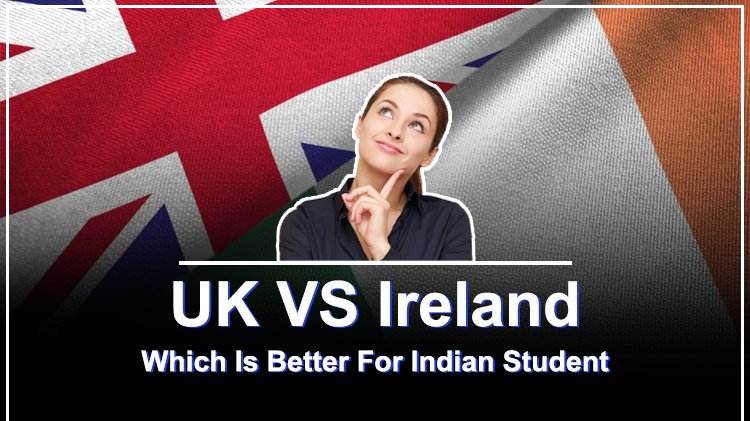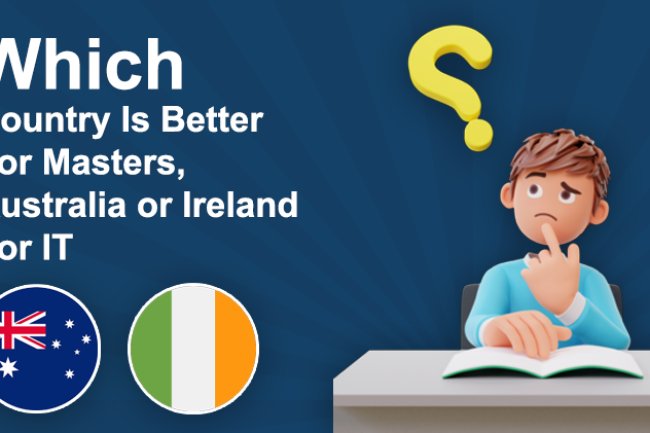UK VS Ireland Which Is Better For Indian Student
When it comes to choosing a place to study, there are a few factors to consider. It might be challenging to compare the UK with Ireland because both have many benefits for students

Whether you choose to study abroad in the UK or Ireland, you can be sure that both countries have top-notch educational systems and some of the best universities in the world for foreign students.
It might be challenging to compare the UK with Ireland because both have many benefits for students, and a lot of the choices come down to personal or lifestyle preferences.
You can use the information below to pick where to spend the next few years earning your degree.
UK
Nursing, psychology, law, computer science, management studies, accounting and finance, biological sciences, etc. are a few of the most well-liked degrees in the UK.
Ireland
Business analytics, investment banking and finance, pharmaceutical sciences, data sciences, computer science, and cyber security are among the popular courses in Ireland for overseas students.
Admission Requirements UK
Premier UK universities used to need 13 years of pre-university study for UG courses. The criteria for admission to UG degrees at UK institutions have recently altered, and they now accept the CBSE plus-two certificate.
You can enrol in postgraduate programmes after earning a three-year undergraduate degree. You must take the GMAT to be admitted to management programmes. Check with the university beforehand as you might not need to take the GRE for science courses.
For management courses in the UK, similar to the US, you might need to have a few years of work experience. The university may waive the TOEFL or IELTS, but they are crucial for obtaining a visa.
Ireland
For each course, a Standard XII academic score of at least 60% is required. Students can enrol in the Foundations and Diploma programmes if they obtained a grade of around 50%. An undergraduate student must be at least 18 years old before starting a degree programme. It's important to remember that while Irish institutions have fewer admission standards, the quality of the education is not worse. As a result, throughout the course of the next few years, you should carefully increase your ability to handle the demanding academic standards.
For undergraduate courses, Irish schools accept applications through Central Applications Office (CAO), an online enrollment system.
You must first register on the CAO website in order to submit your basic information, scanned copies of your documents, a TOEFL or IELTS score, and application fees. You will be kept up to date on all phases of the application process using this account.
Candidates for postgraduate programmes at an Irish university must hold a relevant bachelor's degree or certification. The undergraduate education you completed must be relevant to and cohesive with the master's degree you want to pursue. Candidates would also be required to pass an English proficiency test to prove their command of the language.
Cost of studying an undergraduate program in UK vs Ireland (Approximately)
| UK | Ireland | |
|---|---|---|
| Average Tuition Fee |
BSc: 20 Lakhs BTech: 18 Lakhs BBA: 16 Lakhs |
BSc: 13 Lakhs BTech: 11 Lakhs BBA: 10 Lakhs |
| Average Living Expense | 5 Lakhs | 4 Lakhs |
| Duration | 3-4 Years | 3-4 Years |
| Exams Accepted | IELTS, TOEFL | IELTS, TOEFL |
Cost of studying a postgraduate program in UK vs Ireland (Approximately)
| UK | Ireland | |
|---|---|---|
| Average Tuition Fee |
MA: 17 Lakhs MS: 20 Lakhs MBA: 20 Lakhs |
MA: 13 Lakhs MS: 14 Lakhs MBA: 13 Lakhs |
| Average Living Expense | 5 Lakhs | 4 Lakhs |
| Duration | 1.5-2 Years | 1-2 Years |
| Exams Accepted | IELTS, TOEFL | IELTS, TOEFL |
Student Visa for UK and Ireland
UK
The Tier 4 (general) student visa is referred to as a full-time student visa. These guidelines are applicable to this visa:
- Students who are travelling to the UK to pursue higher education fall under this visa category. The applicant must be at least 16 years old to apply for this.
- Students who plan to pursue a full-time degree are granted a Tier 4 (General) student visa, not those who plan to do short-term or language courses.
- £363 is required to apply for a Tier 4 (General) student visa.
- Students can submit an application for a Tier 4 (General) student visa three months before beginning their desired course of study.
- International students who entered the country on a student visa must be aware of various regulations. One of the limitations on part-time employment while on a UK student visa is a weekly cap of 20 hours of paid or unpaid work for individuals enrolled in degree-level or higher studies. At the period of vacations, full-time employment is permitted.
Ireland
- If a student intends to travel to Ireland to pursue a programme of study for three months or more, they must first apply for an Ireland study visa.
- Those applying would need to demonstrate that they had at least €7,000 in their bank account at the time of their study visa application. This sum covers an international student's living expenses for one academic year in Ireland. Additionally, you must be able to demonstrate that, in addition to the course fee, you or your parents/sponsor will be able to pay at least €7000 for each year of your studies.
- If you have a valid stamp 2, you are allowed to work 20 hours per week during the academic year and 40 hours per week from December 15 to January 15 as well as during the months of May, June, July, and August. These are Ireland's holiday periods, hence the amount of time that can be spent working increases during these times.
Post-Graduate Work Visa in UK and Ireland
UK
- For international students, the UK Home Office has introduced the Graduate Route Visa, a new post-study work visa.
- International students can stay and hunt for work in the UK for two years after receiving their degree from a reputable university there under the Graduate route.
- You must be present in the UK in order to apply for a UK Post Study Work Visa. Additionally, a student visa is required. In addition, you must have completed a bachelor's, postgraduate, or other qualifying degree programme in the UK, and the school or college must have notified The Home Office of your successful completion of the programme.
Ireland
You might want to stay a bit longer after finishing your education in Ireland and consider acquiring a job to gain valuable work experience. If you are enrolled full-time, have an Irish-recognized degree, and have the Visa Stamp 2, you can be qualified for the Third Level Graduate Scheme. The steps in the procedure are as follows:
- After completing a course, students may request a non-renewable extension of up to two years. The objective of this addon is to help you locate a job that suits you.
- You can later apply for a work permit or green card (formerly known as a Critical Skills Employment Permit) (renamed General Employment Permit).
Foreign graduates who are permitted to work under the Third Level Graduate Scheme are now given a new visa stamp, designated Stamp 1G. Therefore, you do not need to submit a new application for a visa extension if Stamp 1G is approved.
Read Also: Study In Ireland
Popular Job Sectors in UK and Ireland
UK
Accountancy, banking and finance, engineering, healthcare, law, information technology, retail, sales, science, and pharmaceuticals are among the top professions in the UK.
Ireland
The leading industries for employment in Ireland are business and finance, healthcare, IT, engineering, life sciences, marketing, etc.
Residency in UK and Ireland
UK
In the UK, permanent residency is also referred to as indefinite leave to remain (ILR). This allows you to permanently reside and work in the UK. If any of the following apply to you:
- You have been a resident of the UK for at least five years;
- You have a work visa;
- You are a relative of a UK citizen or permanent resident;
Ireland
After five years of residence in Ireland with a work permit, you are eligible to apply for an Ireland Permanent Residence Permit. A Stamp 4 will be placed in the passport of foreign applicants who are granted permanent residence in Ireland; this stamp expires after five years. After eight years of lawful residency, the foreign national may also apply for an endorsement that is "Without Condition As To Time," which, as the name suggests, has no predetermined expiration date.
UK
For Indian students, the UK government and universities both provide a wide variety of UK scholarships and fellowships. All prospective students who want to enrol in a full-time study programme in any field are eligible to use these financial aid resources.
Ireland
Ireland has steadily risen to the top of international students' list of favoured study abroad locations, and for good reason. The government, along with Irish colleges, have announced a number of scholarships for the benefit of international students in an effort to boost the flow of foreign nationals for educational purposes.
Climate in UK and Ireland
UK
In the UK, the weather varies and shifts daily. It's challenging to predict the weather. Normal summer temperatures are pleasant, and winters are very snowy. It has colder summers than India. Additionally, because the weather is variable, rains could fall at any time of the year. In the summer, the temperature typically ranges from about 25°C to 15°C, and in the winter, it typically ranges from about 7°C to 0°C. The marine climate and the continental climate are the two main climate regions of the UK. London is located in the south-east of England, which has a maritime climate with regular yearly rainfall.
The continental zone includes much of Scotland, Wales, Northern Ireland, and chunks of northern England. With frigid winters and balmy summers, as well as large yearly precipitation rates, the seasonal temperature fluctuations are noticeably more pronounced.
Ireland
Ireland has a mild oceanic climate thanks to the oppressive impact of the Atlantic Ocean. The average annual temperature is frequently higher—between 9°C and 10°C—in coastal regions. Summer, which has an average temperature of between 18 and 20 degrees Celsius, is the warmest season. July, August, and June are the hottest months. The coldest month is January, which is followed by February and December.
Is Ireland superior to the UK?
The UK is thought to have a higher standard of living than Ireland. This is because of the UK's climate, range of amenities, and safety. Although it may not be as low as in some other European nations, the cost of living in the UK is still less expensive than in the US. Ireland really came in second place out of 189 nations in the United Nations 2020 rankings.
Is Ireland's educational system superior to the UK's?
There are many similarities between Ireland and the United Kingdom. Both of them are based in Europe and speak English as their native tongue. There are a few significant variations between them, though. Both nations boast top-notch educational systems and some of the world's top colleges, it should be mentioned. You might think about the entry requirements, the cost of tuition, and the university where admittance is required when making this decision.
Is Ireland the finest country for foreign students?
Ireland is a fantastic country to study abroad for a number of reasons, including the quality of instruction and education, the range of employment options, and the pleasant lifestyle. Ireland's education system is renowned for being of the highest calibre, having a low cost of living, and being close to other European nations. The nation provides a wide choice of programmes at all levels and options for study.
In Ireland, are you able to obtain permanent residency?
Major adjustments were made to the Irish government's immigration regulations. If you have lived there legally for five years in a row, you may now apply for permanent residency in Ireland. One advantage of this is that your permit won't need to be renewed every year.
How many hours may a student in Ireland work?
During the academic year, one may work up to 20 part-time hours per week of casual employment, and during the college break, one may work up to 40 hours per week.
The best of both the worlds
With their incredible attractions, both nations have something for everyone, and you have the chance to spend your free time discovering a new culture.
The UK is renowned for its parks, marketplaces, shops, clubs, bars, and nightlife. The Yorkshire Dales and moors contain some of the best hiking and bike trails for individuals who are interested in these sports.
Ireland is renowned for its natural beauty and is also referred to as the "Emerald Island." Ireland offers a large number of parks, galleries, stores, restaurants, theatres, and historic structures, just as the UK. As a result, students seldom lack for things to do for fun. Through plays, concerts, exhibitions, shopping, and festivals, it offers nonstop entertainment. Live music can be heard in venues including The Bowery, An Spailpin Fanach, The Bodega, and The Cork Opera House, to name a few. It can range from traditional and classical to heavy metal.
The English Market (in Ireland!) is worth a visit for foodies because you may sample both traditional Irish cuisine and some flavours from other countries. St. Finbarr's Cathedral, the picturesque village of Cobh, the ancient prison turned museum known as Cork City Gaol, and the popular Blarney Castle are also nearby.
Prior to selecting the appropriate university and study location, it is crucial to make sure you take all relevant criteria into account. To learn more, talk to our student advisors.
What's Your Reaction?





















